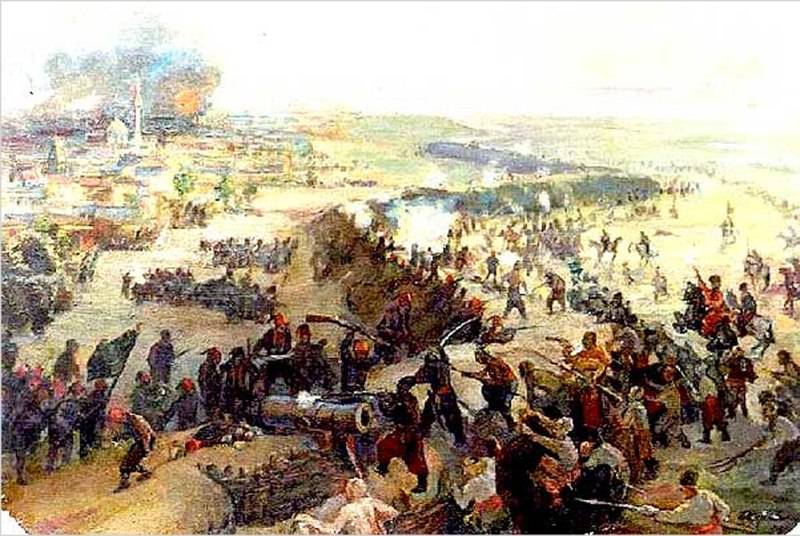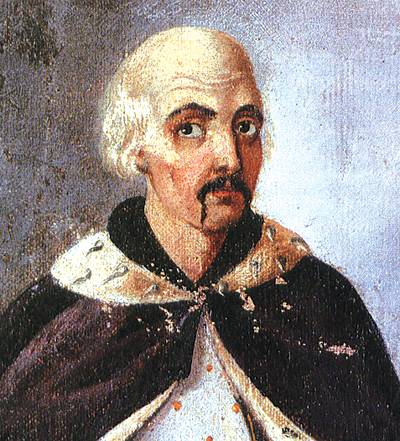War for Russianness: the uprising of Nalivaiko and Loboda

Assault by Zaporizhzhya Cossacks on Turkish fortifications
Russian Cossacks, who considered themselves defenders of Orthodoxy, opposed the union and the Polish colonial policy. Revolts broke out in the Russian Ukraine.
Nalivaiko uprising
Russian Ukraine responded to the Polish colonial policy with large-scale uprisings, almost Cossack-peasant wars (Russian resistance to Polish occupation). In 1591–1593 the uprising was raised by hetman Kosinsky. The war engulfed the Kiev, Volyn, Bratslav and Podolsk provinces.
Kosinsky was treacherously killed, but the Poles had to make peace with the Cossacks. We needed protection from the powerful raids of the Crimean Tatars, who devastated the Commonwealth. In addition, Warsaw entered into an alliance with the Roman See and the Holy Roman Empire, speaking out against Turkey. Emperor Rudolph II offered to join the anti-Turkish alliance and Russia, asked to send Don Cossacks to help. The Cossacks also opposed the common enemy, undertook raids on Ochakov, the Crimea and the Danube.
Meanwhile, the Polish king Sigismund III and the Jesuits prepared a terrible surprise for the Orthodox subjects - the union. In 1596, by order of Sigismund, a church council was convened in Brest. It immediately split into two irreconcilable parties, which sat separately and delivered opposing decisions.
The first, headed by Metropolitan of Kyiv and Galicia Mikhail Rogoza (Ragosa), decided to accept the union with the Latin Church and cursed its opponents. The second - deprived Rogoza of the rank of metropolitan and asked the king to appoint a new one and not to inflict violence in matters of faith. But the king ordered all Orthodox to obey Rogoza as the legitimate head of the Russian Uniate Church. Seizures of the property of the Orthodox Church, land, temples, pogroms by Uniates and Catholics of "irreconcilable" Russian churches and monasteries began.
In 1594 the Russians revolted again. Severin (Semerin) Nalivaiko began the uprising, who had previously served as Prince Ostrozhsky and went with the Cossacks against the Turks and Tatars to Moldova. He was joined by the Cossacks under the command of Hetman Grigory Loboda. In the fall, the Cossacks killed the gentry in Bratslav and captured Bar. A universal was published that called on the Russian people to revolt against the magnates and the gentry. The uprising quickly grew in scale. He was supported by broad sections of the people.
In 1595, the detachments of Nalivaiko went to Volhynia, took Lutsk. The rebels completely exterminated pans, priests (Polish Catholic priest) and Catholics in general. The rebels captured Mogilev, causing a wave of riots in White Rus'. Nalivaiko sent a letter to King Sigismund, offering to allocate free lands to the Cossacks in the interfluve of the Bug and Dniester below Bratslav. At the same time, the troops of Hetman Loboda were advancing on Bila Tserkva. The Cossacks of Matvey Shaul (Savul) entered Kyiv.

Nalivaiko, portrait of the XNUMXth century.
Sharp Stone and Solonitsa
The Russian uprising was expanding and taking a dangerous turn. The king summoned troops from Moldova, instructed the crown hetman Stanislav Zholkevsky to suppress the rebellion in South-Western Rus' (Russian Ukrainian outskirts). Detachments of magnates joined Zholkiewski, voivode Buivid was advancing from Lithuania. In March 1596, the Cossacks Nalivaiko and Shauly defeated the advanced Polish detachment of Prince Ruzhinsky near Belaya Tserkov.
However, soon the main forces of the Polish army under the command of Zolkiewski entered Bila Tserkva - 12 thousand people and 24 guns. The Poles attacked the fortified camp of the Cossacks near the tract of Sharp Stone. The Cossacks skillfully erected well-fortified camps, with rows of wagons surrounded by a rampart and a moat, on which guns were placed. The forces of the Cossacks numbered 7 thousand soldiers with 20 guns. The attacks of the Poles on the Cossack fortifications were repulsed. Both sides suffered heavy losses, Colonel Sasko (Sashko) died, Shaula was seriously wounded. Polish troops withdrew to the city, the Cossacks were able to retreat.
Under pressure from superior enemy forces, the Cossacks withdrew to the Left Bank of the Dnieper. The situation was aggravated by the conflict between Nalivaiko and Loboda. Loboda was supported mainly by the so-called "registrars", Nalivaiko - "mob". Crown Hetman Zholkiewski offered Loboda to start negotiations. Loboda was accused by ordinary Cossacks of treason, as a supporter of negotiations with the gentry, and was killed by the "mob" during the siege of the Cossack camp by the Poles in the Solonitsa tract near Luben.
In May 1596, Polish troops were able to surround the Cossacks in the Solonitsa tract. There were about 10 thousand people in the camp, 6 thousand fighters and members of their families, wounded. The siege lasted almost two weeks. The Cossacks suffered heavy losses from shelling, there was not enough food and water, and a massive loss of horses began. As a result, the “registers” seized Nalivaiko, Shaula and other leaders of the “mob” and handed them over to the pans. The Poles deceived the Cossacks, and there was no amnesty. Polish troops attacked the demoralized Cossacks and massacred several thousand people, including women and children. Only a detachment of Colonel Krempsky broke through to the Zaporizhzhya Sich.
Nalivaiko, Shaula and other rebel leaders were sent to Warsaw, where they were executed on April 11, 1597 after severe torture. Additional measures were introduced against the Cossacks. The gentry of the Kyiv, Bratslav and Volyn voivodships were entrusted with the supervision of the Cossacks, they were ordered to arrest all suspicious ones, disperse any groups, even small ones of 5-6 people, and stop all relations between the Russian Ukraine and Zaporozhye.
However, protests against the union did not stop, there were uprisings in Dobrovnitsa (1601), Ostra (1602), Bratslav and Korsun (1607). The Sejm ordered "merciless punishments" for any "excesses". Sigismund wanted to do away with the Cossacks altogether, ordered the register to be reduced to 1 Cossacks, and was going to ruin the Sich. Conflicts with neighboring countries and the opposition of the magnates did not allow this plan to be carried out.
At first, the Poles managed to suppress the uprising of Southwestern Rus'. Leaders and captured rebels were subjected to terrible tortures and executions: quartered, hung on hooks under the ribs, impaled, burned alive. Ruined and burned Russian villages. Terror stabilized the situation for a while. But soon a new uprising began.
- Alexander Samsonov
- https://ru.wikipedia.org/
Information